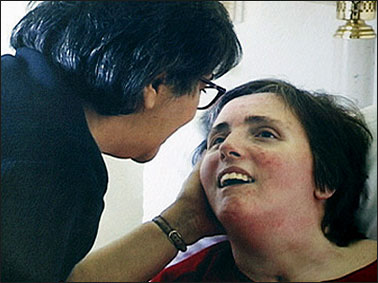

The New England Journal of Medicine released a study today revealing some awareness in a minority of patients diagnosed with Persistent Vegetative State (PVS). Researchers used functional MRI tests on 54 patients with PVS or minimally conscious state (MCI). The MCI patient data is interesting but the meat of the study is in the 23 patients diagnosed as being in a persistent vegetative state, meaning that clinically all exams showed no signs of awareness. Four of these 23 patients showed brain activity in areas similar as healthy control subjects when given specific commands. One of these four patients was also able to respond to factual statements correctly by using a technique similar to answering yes-no questions.
My favorite part of the article is in the discussion section:
In the future, this approach could be used to address important clinical questions. For example, patients could be asked if they are feeling any pain, and this information could be useful in determining whether analgesic agents should be administered.
This would be the dawn of a new era where we have new tools to evaluate the symptoms of those who cannot verbally or physically communicate with us at the bedside. The caveat is the most patients with PVS in this study showed no signs of awareness and could not communicate in any significant manner even when placed in the fMRI machine.
Take a guess though what the media headlines focus on:
- Scientists read the minds of the living dead (New Zealand Herald)
- Patients in ‘vegetative’ state can think and communicate (The Telegraph)
- Brain scan shows awareness in vegetative patients (BBC News)
- Brains of vegetative patients show life (LA Times)
- Study Finds Cognition in Vegetative Patients (Wall Street Journal)
These headlines are just wrong. They give the impression that all patients with PVS are aware and can communicate. In truth, this study showed that a minority of patients with PVS showed some signs of awareness, and those happened to only be in those who suffered from a traumatic brain injury (not from other causes such as anoxic brain injury). To be fair, there were some more appropriate headlines including Newsday with “Some vegetative brains show signs of awareness” and BusinessWeeks “Brain Scans Suggest Some Vegetative Patients May Be Aware”, but overall the media continues to show limited signs of self-awareness when reporting on journal articles.
Reference:
Monti, M., Vanhaudenhuyse, A., Coleman, M., Boly, M., Pickard, J., Tshibanda, L., Owen, A., & Laureys, S. (2010). Willful Modulation of Brain Activity in Disorders of Consciousness New England Journal of Medicine DOI: 10.1056/NEJMoa0905370



